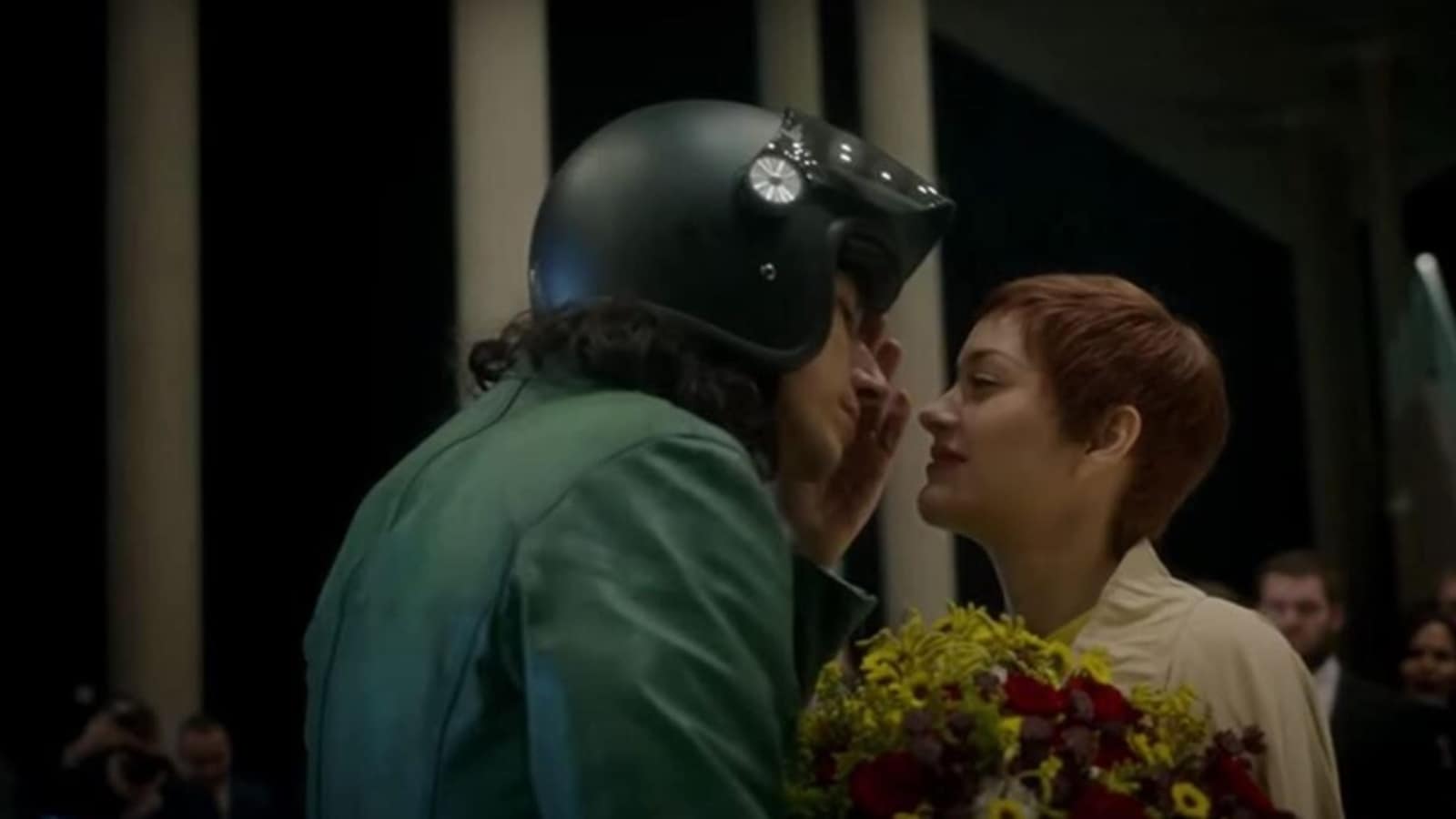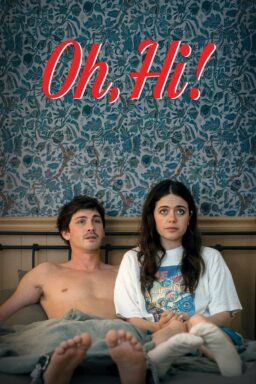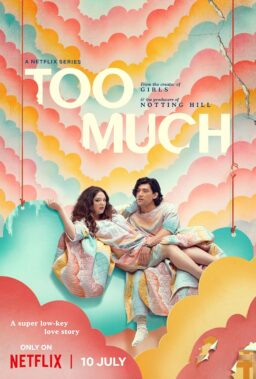Leos Carax‘s “Annette,” which opened the 2021 Cannes Film Festival today, begins by demanding complete attention from its audience. An announcer tells viewers that if they want to sing, clap, laugh or fart, they should do so only in their heads. “Breathing will not be tolerated during the show,” he adds.
The line got at least some laughter in the Debussy theater, where “Annette” screened tonight for the press. The auditorium was, while not desolate, noticeably emptier than it would have been in previous years; there were more than 100 empty seats in the balcony alone, in what should have been a packed house. The pandemic isn’t necessarily the only reason for that. Some critics saw “Annette” in advance. Judging from the TV coverage of the opening ceremony, the formal screening down the street was packed. (Spike Lee, this year’s jury president, fully detonated the dress code by attending in Nikes, a hot-pink suit, and matching glasses.)
But breathing, of course, is a loaded topic at Cannes 2021. COVID-19 caused the cancellation of the 2020 edition, and this year, the festival looks somewhat different. Masks are required in all theaters. Entry into screenings is timed. The old accreditations pickup site is now a vaccination center. And let’s be clear: I’m only here because I’m lucky enough to be fully vaccinated. Spending this much time in theaters with strangers would be terrifying (and probably foolish) otherwise.
The new protocols have had their hiccups. Cannes has replaced its fractious, crowded queues with an online ticketing system that, by crashing when the masses log in at the same designated time, offers the virtual equivalent of the old Cannes bottleneck experience.
But it’s Cannes, and attending the world’s most prestigious film festival wouldn’t be the same if there weren’t hurdles to jump through for the love of cinema. If the circumstances of this year’s event have thinned out some of the crowds, they haven’t, judging from the auteur-packed lineup, dimmed the festival’s luster, or made the weather in the South of France any less delightful.
It also wouldn’t be Cannes if it didn’t deliver challenging, sui generis movies—and “Annette,” the long-awaited musical from director Leos Carax, working with an original story and songs by the band Sparks, would be strange enough on its own to keep the fest chattering for the next two weeks, even without 23 other features in competition.
In “The Sparks Brothers,” Edgar Wright’s recent documentary on the band—the musician siblings Ron and Russell Mael—the brothers discuss dream projects for Jacques Tati and Tim Burton that never came to fruition. And while “Annette,” which grew out of Carax’s use one of their songs in “Holy Motors” (2012), technically isn’t one of those what-ifs, it has the feel of one. Carax, whose own movies take a broad-minded attitude toward popular culture (“Holy Motors” was an ode to the infinite plasticity of movies and of the actor Denis Lavant), seems perfectly in tune with their sensibility. He—or rather, “LC”—is also co-credited with the lyrics.

But what exactly is “Annette”? Like most things Sparks and Carax, it’s tough to reduce to a simple reaction. Part of me wants to say I loved it, but it’s not a movie that wants to be loved, and in a weird way “love” is the wrong response to a film that is often slow and abrasive, and deliberately hits a lot of discordant notes. Not every sequence or number lands. If this is a movie that begins with an explicit demand for the audience’s attention, it’s also a film that, depending on how the ending is taken, concludes by begging not to be watched.
In some respects it’s crazy; in others it’s simple, elemental, and true. The film is couched in so many layers of irony that it’s difficult to figure out where it stands, and where you as a viewer stand relative to it. But the closest comparison I can think of in recent movies is Lars von Trier’s “Dancer in the Dark.” Even ardent champions of that film will struggle to understand its peculiar alchemy of Björk, melodrama and early 21st-century digital video. With “Annette,” visually, tonally and musically, it’s difficult to define what you’re watching. The operetta-like format allows for everything from full-fledged arias to showtunes to rap to a gentle yet hilarious near-round in which doctors and nurses coach Marion Cotillard‘s character through labor (“Breathe in breathe out breathe in”).
Carax and the Maels are more openly self-reflexive than Von Trier: All three appear in the opening scene of “Annette” as themselves, and the Sparks brothers later have cameos as jet pilots. The opening number, which shows Carax sitting at a sound-mixing board, has Russell singing about the movie they’ve all gathered to make. A sensational single take follows the Maels and the principal actors through the streets of Los Angeles—whereupon the stars, Cotillard and Adam Driver, put on costumes, get into cars and drive their separate ways as their characters.

Broadly speaking, the plot concerns a mismatched couple, who at the start of the film are engaged: Ann (Marion Cotillard) is the toast of the opera world, a beloved soprano. (Catherine Trottmann does her singing for those scenes, though Cotillard sings in others.) Driver, who proved his singing chops at the end of “Marriage Story,” is Henry, a comedian whose routines aren’t particularly funny—and probably aren’t meant to be, at least for us. Under the nickname “the Ape of God,” he struts onto stage in a boxer’s robe. His willfully offensive sets seem to consist mainly of volleyed hostilities with an interacting audience, sometimes in song. As with much of the film, it’s difficult to say where stylizations ends and narrative begins.
Whatever else you might call it, “Annette” is not a romance. As actors, Cotillard and Driver have the opposite of chemistry, which appears to be the point. Ann has a dream in which she imagines Henry’s #MeToo moment: In “Six Women Have Come Forward,” one of the catchier tunes, a half-dozen women hold a press conference to sing about Henry’s violence and anger. But Ann and Henry’s darkening marriage notwithstanding, they soon have a daughter, Annette. And a particular conceit involving her character ought not be spoiled. Suffice it to say that it takes a superficially silly idea and plays it straight, with deeply moving results, finding tragic dimensions in the absurd.
In “The Sparks Brothers,” Ron Mael says that he and his brother like to create polarizing work. While the returns are just trickling in on “Annette,” it seems fair to assume it will qualify. I’m not sure how anyone can resist a film that so brazenly mixes elements of Stephen Sondheim (whom Carax cites as an influence), Lynchian surrealism, Theodore Dreiser, and maybe even the Chucky movies. If the film hadn’t long been in the works, I’d guess that the Maels and Carax had even caught this year’s revival of Jacques Deray’s “La Piscine.”
I don’t know what “Annette” is, except that it’s “Annette,” and that it’s unique.












